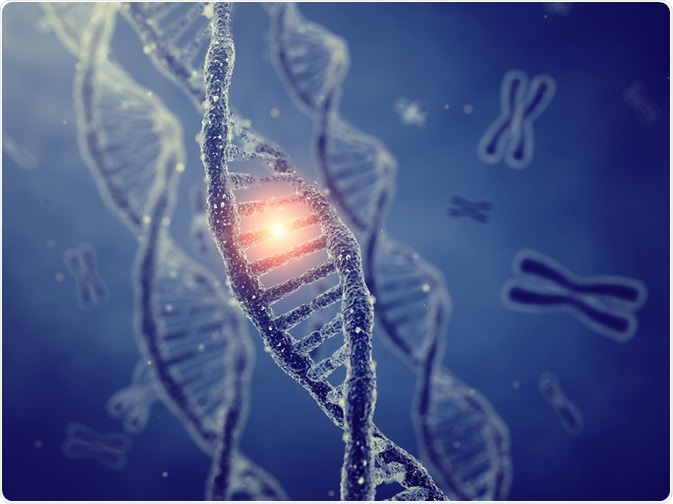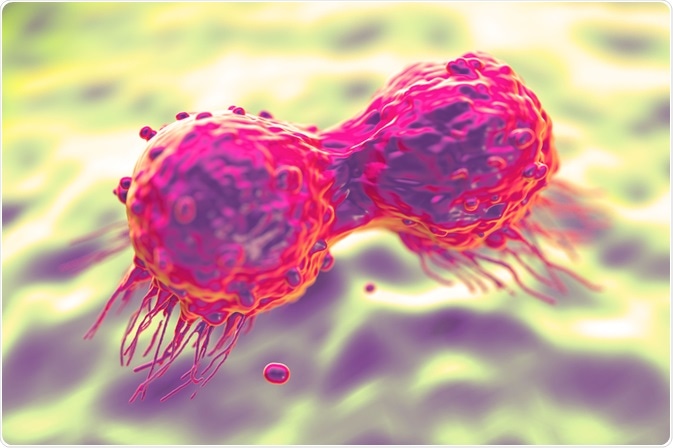Allele-specific expression or allelic expression analysis is an increasingly valuable tool, as it allows scientists to examine the biological control of particular gene expression patterns in human health and diseases.

Image Credit: nobeastsofierce/Shutterstock.com
A variant form of a given gene is known as an allele. Genes can have many various forms that are placed at the same site, or locus, on a chromosome. Diploid organisms, such as humans, have two alleles at each genetic locus, and chromosomes always come in pairs.
In any homologous pair, one homologous chromosome is inherited from the male parent, and the other comes from the female parent. Homologous chromosomes have the same length, centromere position, and genes with the same types of trait within the same corresponding loci.
In diploid organisms, gene expression is considered to be a sophisticated trait that comes from the transcription of both maternal and paternal alleles.
Compared to total gene expression, analyzing allelic expression offers greater information about regulatory variation. Analysis of allelic expression has become crucial for combining genome and transcriptome data in identifying different biological phenomena such as nonsense-mediated decay, which is triggered by variants making a premature stop codon and cis-regulatory variations caused by promoters and enhancers mostly situated near to the gene that they regulate.
The advancement in high-throughput sequencing gives an excellent possibility to analyze allelic expression for virtually any species.
Allelic expression analysis and cancer
Owing to the great number of cancer-relevant mutations in noncoding regions and the difficulty seen in interpreting their impact, it is very challenging to identify such mutations. In 2020, a recent study tried to identify genes dysregulated due to somatic mutations in cis.
Researchers proposed methods to characterize genes within an individual’s cancer whose allelic expression varies from what is detected in corresponding normal tissues. They revealed the impact of allele expression of copy number variation and nonsense-mediated decay in breast cancer tumor samples.
Researchers found that differential allele expression detects breast cancer genes that are dysregulated by cis noncoding mutations. Recognizing genes where a variant allele is preferentially expressed in tumors may result in better-targeted therapy and an ideal explanation of cancer biology. In advanced ovarian cancer, the analysis of preferential allele expression helps in determining shared germline and somatic driver genes.
The allele-specific expression has a significant role in the understanding of tumor initiation and progression. Liu and colleagues reported a systematic explanation of how allele-specific expression is influenced in both tumor and normal tissues and expected to be of critical value in guiding allele-specific expression studies in cancer.
They conducted a comprehensive analysis of allele-specific expression in colorectal cancer patients on a genome-wide scale. They found more than 5000 genome-wide allele-specific expressions of single nucleotide variations from tumor and normal tissues of 59 colorectal cancer patients.
Researchers reported an increased allele-specific expression rate in tumor samples and the allele-specific expressions enriched as hotspots on the genome.
Recent studies found that allele-specific expression at a particular cancer driver gene loci could be linked to the onset or progression of some diseases, particularly loss-of-function of tumor suppressor gene alleles.
In most cases, loss-of-function tumor suppressor mutations are recessive. However, the outcome will be very significant if these mutant alleles are remarkably differentially expressed relative to wild-type alleles in heterozygotes.
In 2020, Clayton and colleagues first reported that loss-of-function of tumor suppressor gene alleles are segregating in human populations at remarkable frequencies, showing that many otherwise healthy individuals are at high risk of having cancer. The Loss-of-function of tumor suppressor gene alleles may contribute to cancer initiation or progression.
Curia and colleagues found that colorectal cancer patients have an increased variance in germline allele-specific expression of adenomatous polyposis coli.
Genotype analysis of adenomatous polyposis coli found that there is a correlation between multiple single-nucleotide polymorphisms and allele-specific expression values among colorectal cancer patients, but not controls.

Image Credit: royaltystockphoto.com/Shutterstock.com
Allelic expression analysis and immunity
In memory CD4+ T cell regulatory elements, autoimmune susceptibility variants are over-represented. So, it is necessary to understand how genetic variation impacts the expression of genes in several T cell physiological conditions.
In 2020, Gutierrez-Arcelus and colleagues described the dynamics of genetic regulatory effects at eight-time points during memory CD4+ T cell activation with high-depth RNA-seq in healthy individuals. They found broad, dynamic allele expression through the genome, where allele balance differs over some time.
They reported that genetic variation in cis-regulatory elements has an impact on gene expression in a manner dependent on lymphocyte activation condition, playing a part in the interindividual complexity of immune reactions.
Human dendritic cells have a significant role in the initiation and progression of Crohn’s disease. In genetically predisposed individuals, viral infection may trigger Crohn’s disease pathogenesis. Two genes (NOD2 and ATG16L1) are among the major Crohn’s disease susceptibility genes implicated in the impaired immune response to bacterial infection.
Hu and colleagues found that allelic imbalance of the NOD2 and ATG16L1 genes presents in populations of human dendritic cells. They also suggested that viral infection may have a role in the regulation of NOD2 expression.
Sources
- Castel, S. E., Levy-Moonshine, A., Mohammadi, P., Banks, E., & Lappalainen, T. (2015). Tools and best practices for data processing in allelic expression analysis. Genome Biology, 16(1), 195.
- Clayton, E.A., Khalid, S., Ban, D., Wang, L., Jordan, I.K., and McDonald, J.F., 2020. Tumor suppressor genes and allele-specific expression: mechanisms and significance. Oncotarget, 11(4), p.462.
- Curia, M.C., De Iure, S., De Lellis, L., Veschi, S., Mammarella, S., White, M.J., Bartlett, J., Di Iorio, A., Amatetti, C., Lombardo, M., and Di Gregorio, P., 2012. Increased variance in germline allele-specific expression of APC associates with colorectal cancer. Gastroenterology, 142(1), pp.71-77.
- De La Chapelle, A., 2009. Genetic predisposition to human disease: allele-specific expression and low-penetrance regulatory loci. Oncogene, 28(38), pp.3345-3348.
- Fontanillas, P., Landry, C.R., Wittkopp, P.J., Russ, C., Gruber, J.D., Nusbaum, C., and Hartl, D.L., 2010. Key considerations for measuring allelic expression on a genomic scale using high‐throughput sequencing. Molecular Ecology, 19, pp.212-227.
- Gutierrez-Arcelus, M., Baglaenko, Y., Arora, J., Hannes, S., Luo, Y., Amariuta, T., Teslovich, N., Rao, D.A., Ermann, J., Jonsson, A.H. and Navarrete, C., 2020. Allele-specific expression changes dynamically during T cell activation in HLA and other autoimmune loci. Nature Genetics, 52(3), pp.247-253.
- Halabi, N.M., Martinez, A., Al-Farsi, H., Mery, E., Puydenus, L., Pujol, P., Khalak, H.G., McLurcan, C., Ferron, G., Querleu, D. and Al-Azwani, I., 2016. Preferential Allele Expression Analysis Identifies Shared Germline and Somatic Driver Genes in Advanced Ovarian Cancer. PLoS genetics, 12(1).
- Hu, J., and Peter, I., 2013. Evidence of expression variation and allelic imbalance in Crohn's disease susceptibility genes NOD2 and ATG16L1 in human dendritic cells. Gene, 527(2), pp.496-502.
- Liu, Z., Dong, X. and Li, Y., 2018. A Genome-Wide Study of Allele-Specific Expression in Colorectal Cancer. Frontiers in genetics, 9, p.570.
- Liu, Z., Dong, X. and Li, Y., 2018. A Genome-Wide Study of Allele-Specific Expression in Colorectal Cancer. Frontiers in genetics, 9, p.570.
- Przytycki, P.F., and Singh, M., 2020. Differential Allele-Specific Expression Uncovers Breast Cancer Genes Dysregulated By Cis Noncoding Mutations. Cell Systems, 10(2), pp.193-203.
Further Reading
Last Updated: May 6, 2020